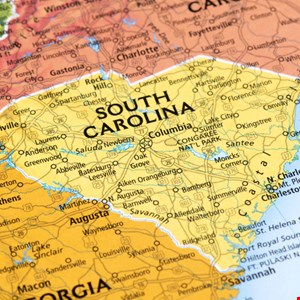- AI 아바타 시장 2032년까지 33.1% 성장 전망···마켓앤마켓, 개인화된 고객 경험 증가가 성장 견인
- Kali Linux gets a UI refresh, new tools, and an updated car hacking toolset
- How the Sandwich Generation Can Fight Back Against Scams | McAfee Blog
- Buy a Samsung Galaxy Watch 7 on sale and get a free SmartTag2 Bluetooth tracker - here's how
- Cisco capitalizes on Isovalent buy, unveils new load balancer
South Carolina Plans Cyber-Ecosystem

The University of South Carolina (UofSC) has struck up a partnership with the Palmetto State to develop a statewide cyber-ecosystem aimed at making South Carolina a highly competitive player in the cyber-industry.
The new alliance was announced Thursday, February 4, by South Carolina governor Henry McMaster and the University’s president, Bob Caslen. Under the ecosystem, the efforts of South Carolina’s public and private organizations operating in the cyber-field will be aligned according to one unified vision.
“The university looks forward to joining government and industry in this critical statewide effort,” said Caslen. “As South Carolina’s flagship university, we are uniquely positioned to help develop the future cyber-workforce the state needs as well as inform stakeholders on emerging cyber-research and best practices that impact security and the state’s economy.”
An initial study to inventory the state’s cyber-assets, analyze key strengths and gaps, and form a development strategy was announced by McMaster at a State House press conference. The study will take a reading of South Carolina’s current cyber-ecosystem by recording verticals in defense partnerships, investment, education, public awareness, and workforce and industry development.
“This statewide cyber-strategy is an opportunity to develop a cyber ecosystem that trains, attracts, and produces a workforce for the knowledge economy’s high-tech, high-paying jobs,” said McMaster. “Cyber-professionals are in high demand, and through these efforts we can make South Carolina one of the nation’s premier cyber-hubs.”
Key public and private stakeholders in the cyber industry will be selected to join a coordinating committee whose role it will be to guide the study, support data collection, and conduct an assessment of the state’s cyber-assets. The results of the study will form the basis of a plan to improve cyber-coordination, capability, and capacity across South Carolina.
South Carolina’s cyber-assets include the Naval Information Warfare Center in Charleston and the recently announced Savannah River National Laboratory collaboration involving the US Department of Energy and three South Carolina universities.
Bill Kirkland, executive director of UofSC’s Office of Innovation, Partnerships, and Economic Engagement, said that the University’s long-term plans include the creation of a new asset: a Cyber Institute that will combine education, research, outreach, and workforce development.

